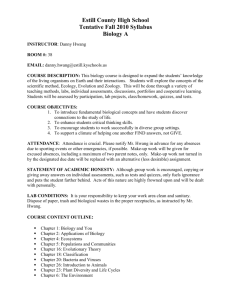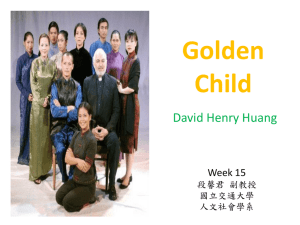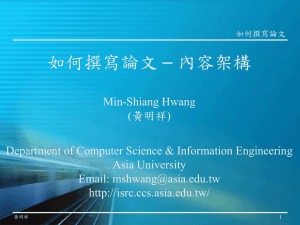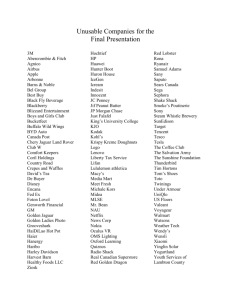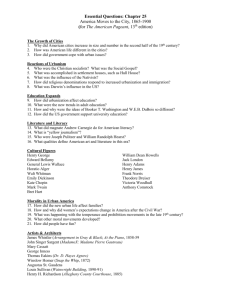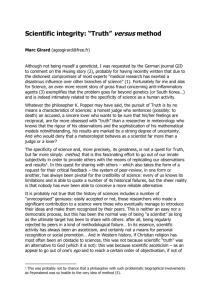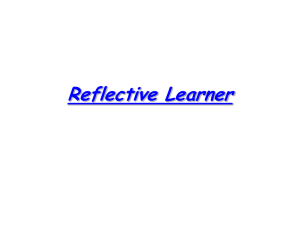Golden Child
advertisement
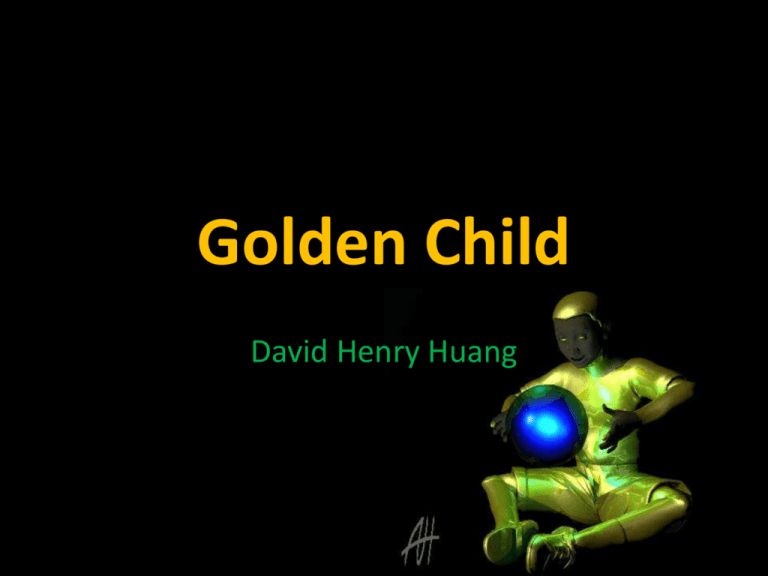
Golden Child David Henry Huang David Henry Hwang Asian-American playwright David Henry Hwang was inspired to write the award-winning play Golden Child based on his interviews with his grandmother living in Cebu. Tanghalang Pilipino is staging this two-act play until September 7 at the Cultural Center of the Philippines. • David Henry Hwang (1957-) was born in Los Angeles and grew up in San Gabriel, as the first generation of a Chinese American fundamentalist Christian family. His father, a banker, immigrated to the US from Shanghai in the late 1940s, and his mother, a pianist and music teacher, although born in China was reared in the Philippines. David Henry Hwang • One of three siblings, David Henry Hwang, a star debater and violinist, attended an elite preparatory academy (the Harvard School) in North Hollywood and, on graduation in 1975, went to Stanford University where he graduated Phi Beta Kappa in English. • In 1979, Hwang submitted F.O.B. to the National Playwright Conference at the O’Neill Theater Center in Waterford, CT, where the play was staged with professional actors. In The Golden Child, set in the early part of the 20th century, Hwang would delve deeper into his family history to create a portrait of a traditional Chinese family on the cusp of jarring change. David Henry Hwang • The following season, the Henry Street Settlement in New York City commissioned a new play by David Henry Hwang for a forthcoming ethnic heritage series; The Dance and the Railroad transferred to the Public Theater with actors John Lone and Tzi Ma as two Chinese laborers hired to build the transcontinental railroad across the United States in the midnineteenth century. David Henry Hwang • Having had four plays produced in three years, Hwang took a break and traveled to Canada, Europe and Asia to reassess his newly acquired status as an Asian American voice in U.S. culture. • Hwang returned to write Rich Relations, Bondage, Face Value, and Trying to Find China Town, along with television, screenplays, and the Tony award-winning M. Butterfly, produced on Broadway in 1988, based on a real-life espionage case involving a French diplomat and a male Chinese agent masquerading as an actress with the Beijing Opera. David Henry Hwang • More recently, David Henry Hwang joined as a librettist with composer Philip Glass and stage designer Jerome Sirlin to create a “science fiction music drama” called 1000 Airplanes on the Roof, followed by The Voyage, again with composer Philip Glass, commissioned by the Metropolitan Opera Company. • Hwang turned again to his contemplations on race, gender, and cultural identity in Golden Child, produced on Broadway in 1998. The works of David Henry Hwang • Full-length playsFOB (1980) · Family Devotions (1981) · Rich Relations (1986) · M. Butterfly (1988) · Face Value (1993) · Golden Child (1996) ·Peer Gynt (1998, with Stephan Muller; from Ibsen) · Tibet Through the Red Box (2004, from Sis) · Yellow Face (2007) • Short playsThe Dance and the Railroad (1981) · The House of Sleeping Beauties (1983, from Kawabata) · The Sound of a Voice (1983) ·As the Crow Flies (1986) · Bondage (1992) · Trying to Find Chinatown (1996) · Bang Kok (1996) · Merchandising (1999) ·Jade Flowerpots and Bound Feet (2001) · The Great Helmsman (2007) • Film/televisionBlind Alleys (1985, with Kimball) · M. Butterfly (1993) · Golden Gate (1994) · The Lost Empire (2001) ·Possession (2002, with Jones and LaBute, from Byatt) • Music theatre1000 Airplanes on the Roof (1988, with Glass and Sirlin) · The Voyage (1992, with Glass) · The Silver River (1997, with Sheng) ·Aida (2000, with Woolverton & Falls, John and Rice, from Verdi) ·Flower Drum Song (2001, with Rodgers and Hammerstein, from Fields, Hammerstein, and Lee) · Ainadamar (2003, with Golijov) ·The Sound of a Voice (2004, with Glass) · Tarzan (2006, with Collins, from Burroughs) ·Alice in Wonderland (2007, with Chin, from Carroll) · The Fly (2008, with Shore) Critical Introduction to Golden Child • Playwright David Henry Hwang describes his work as a personal journey that just happens to have a “public dimension”. Golden Child combines these dual facets of the personal and the public that characterize Hwang’s writing. Directed by Sandra Rockman January 17 (preview) to February 9, 2008 Nevada Theatre, CA. Critical Introduction to Golden Child • Hwang’s play had its inception in an unpublished novel, called Only Three Generations and based on tape-recorded conversations with his maternal grandmother about the family’s history in China. • On several occasions, Hwang cites Anton Chekhov’s The Three Sisters. Rather than the sisters, Hwang’s play features three wives (polygamy was the norm of the time in China). Golden Child went on to Broadway and Julyana was nominated for a Tony Award for the role. Critical Introduction to Golden Child • Unlike Tennessee Williams’s The Glass Menagerie where Tom Wingfield, the narrator, plays a younger version of himself in his family story, the narrator of Golden Child doubles as his greatgrandfather in scenes from 1918 to 1919. • The inner play finds the actor playing Andrew doubling as his great-grandfather and the actress playing his wife Elizabeth doubling as Eling, a Chinese woman in her early twenties. Critical Introduction to Golden Child • The inner play takes place in the household of Eng Tieng-Bin in China with his three wives (Eng Siu-Young, Eng Luan, and Eng Eling) in various states of conflict within a household managed by the three women. • It is not this playwright’s intention to treat the encroachment of Western ideals on China as an act that contaminates or destroys a way of life. Instead, Hwang insists that the exchange of ideas creates opportunities for personal growth, for new ways of thinking, and release from such constraints as foot binding and ancestor worship that keep people anchored to the past, mired in the present, and fearful of the future. GOLDEN CHILD, by David Henry Hwang. Produced by Silk Road Theatre Project. Opened March 2007 at Pierce Hall Directed by Stuart Carden. Critical Introduction to Golden Child • Golden Child functions as an intercultural text on several levels. In structure, it combines realistic well-made playwriting with the familiar dramatic frame of the memory play, thus creating the outer and the inner worlds of the play. • As an intercultural text, Golden Child blends cultural and theatrical traditions of East and West in this story of familiar change. • In the intermingling of theatrical traditions of Western writing and Eastern lifestyle, David Henry Hwang speaks with a universal voice on issues of freedom and responsibility common to all humankind. Critical Introduction to Golden Child • Golden Child, according to David Henry Hwang, was a “problem child”. • Golden Child opened at the Public Theater to mixed reviews but producers stepped in and the play went into development again with an eye toward a Broadway production. • Golden Child reached the Longacre Theatre on Broadway on April, 2, 1998, with director James Lapine and designers Tony Straiges and Martin Pakledinaz. Synopsis • Andrew Kwong is visited in a dream by his longdeceased Grandmother, Ahn, who insists on telling him the story of her father once again to give him one last chance to make a new life. • Eng Tieng Bin’s family in China awaits his return after spending several years of doing business in the Philippines. His three wives worry about the effect of his apparent interest in Western ways on a household where ancestor worship is observed and traditional rituals are practiced, setting off a power struggle among them. Synopsis • After handing out gifts to his wives – Siu Yong, Luan and Eling, Tieng Bin announces that he has invited Reverend Baines, a British missionary, to visit. He later orders the unbinding of Ahn’s feet, contrary to tradition. It becomes clear that Tieng Bin has decided to turn his back on Chinese customs and convert to Christianity, and his wives’ worries become more pronounced: will he also choose just one woman as his chosen wife? • Tieng Bin’s decision results in unexpected consequences he does not plan for nor remotely expects. It is his prized offspring, Ahn, his Golden Child, who encourages him to go back to the Philippines and promises to tell great stories about how he made them all born again. Performing Golden Child • Prior to its Broadway opening on April 2, 1998, Golden Child had a number of developmental readings and workshops at the South Coast Repertory Theater in Costa Mesa, CA, the Trinity Repertory Company in residence at Breadloaf in Vermont, the Singapore Repertory Theatre, the American Conservatory Theatre in San Francisco, and The John F. Kennedy Center in Washington, D.C., before its premiere at The Joseph Papp Public Theater/New York Shakespeare Festival in New York City. • Golden Child • By David Henry Hwang Directed by Stuart Carden. March 1 - May 6, 2007 Critics’ Notebook on Asian American Drama • For many years the standard English-language sources on Asian theater practice were written by Faubion Bowers (Japanese Theatre, 1952) and James R. Brandon. • With the emergence of Asian American playwrights in the nonprofit and commercial theater on the United States in the last quarter of the twentieth century, anthologies of plays and collections of interviews have been added to the literature. Critics’ Notebook on Asian American Drama • Creating his most personal and emotional work to date, David Henry Hwang draws on the true stories told to him by his grandmother of his great-grandfather's break with Confucian tradition by his conversion to Christianity, and the eventual unbinding of his daughter's feet. Golden Child explores the impact of these decisions on each of his greatgrandfather's three wives, and succeeding generations. The core of us Golden Child By Jeff Hudson • David Henry Hwang’s Golden Child, however, is something else—a story about modern/Western ideas moving into traditional Chinese culture. Largely set in 1918, the play features a progressive landowner (Hock Tjoa) who traveled abroad and embraced Western notions about individualism. • To the horror of his three wives (who don’t entirely get along), the landowner is exploring Christianity, which initially plays as light comedy but becomes more serious as the play progresses (practicing Christians acknowledge only one wife per husband). • To make matters worse, the landowner—despite the fact that he finds women with “huge feet” unattractive—orders First Wife (Yukiko Ohse) to stop binding the feet of their precocious pre-teen daughter. • Tjoa taps into the landowner’s compassion and desire What could be worse than for knowledge, and also his inner conflict, as he tries to reconcile traditional ancestor worship with new ways. having one wife? The core of us Golden Child By Jeff Hudson • First Wife, an arranged spouse, retreats into opium when a “white devil” Anglican missionary (John Fisher) arrives. Second Wife (Lisa Moon) schemes to advance herself. Third Wife (Cacie Mularchuk), the pretty girl that the landowner picked for himself, comes from poverty and can’t grasp the depth of the change underway. • Through it all, the playwright asks, “What is it that makes you Chinese?” and “How do you adapt your identity in a time of rapid, radical and inevitable change—coming from outside?” We Americans face a similar situation today. Hwang presents this play in a historic context, but the core agenda hits us where we live. • The CATS production features an elaborate, multilevel set, depicting Chinese pavilions supported by stately red columns. The costumes recall silk fashions from 100 years ago. Last Friday’s opening performance featured a few more line glitches and little snafus than other recent CATS productions, which tend to be pretty polished. But director Sandra Rockman’s take on the script is savvy, and the show grows on you as the story unfolds. Dorinne Kondo, from About Face: Performing Race in Fashion and Theater • Given this particular sedimented history, Asian Americans have a specific relation to the notion of home. For mainland Asian Americans, surely one of the most insistent features of our particular oppression is our ineradicable foreignness. • Given the continuing confusion of Asians with Asian Americans, perhaps it is not surprising that one of the most insistent themes in Asian American literature and theater is a preoccupation with the claiming of America as home… Revisiting Interculturalism • Intercultural texts demonstrate the collision of cultures as writers from minority cultures living in the West explore the contradictions, ambivalences, and difficulties of the struggle to retain ethnic, social, and ideological separateness in worlds that discourage exclusiveness. Revisiting Interculturalism • Conflict has been the basis of drama since its beginnings in the early Greek festivals. Intercultural dissonances are one recent source of dramatic conflict in new American playwriting since the eighties. • Within the context of cultural diversity, efforts to combine the riches of various cultures into new artistic achievements are also celebrated under the label transcultural. Revisiting Interculturalism • Transcultural artistic expression and intercultural writing are ways contemporary writers and artists mirror their multicultural society and address global issues that affect all humankind. • Playwright David Henry Hwang discusses his experiences with cultural assimilation and family, topics he focuses on in his play, "Golden Child". (play 42:05-the end) http://video.google.com/videoplay?docid=66 9783166282121566# Review • A Curtain Up Review Golden Child On Broadway • David Henry Hwang’s Golden Child won an OBIE after its run at the Public Theater seventeen months ago despite decidedly mixed reviews. CurtainUp's review came in on the thumbs up side. Most of the negative comments related to the awkwardness of the opening and closing scenes set in contemporary New York. • The play still focuses on the flashback to China, circa 1918 and the conflict between tradition and change as depicted through one man's family • The actors who made the strongest contribution to the play's pleasures, have reprised their roles in this production -- Tsai Chin as the first and most dramatically important of the three wives and Julyana Soelistyo in her dual role as the play's title character and as the narrator Andrew's grandmother. • Director James Lapine continues at the helm and the physical production is beautiful as ever with the same set, lighting and costume designers in place. Review • Alas, all the rewriting -- making the narrator older, having grandmother appear in a dream instead of as a vision in a taxicab -- has done little to dispel the quibbles that sent Mr. Hwang back to his computer keyboard to begin with. The general consensus seems even more mixed than for the original Off-Broadway production: Matt Wolf of Variety wrote "The burden of ancestry may be one of many provocative concerns in David Henry Hwang’s Golden Child, but such issues ultimately pale next to a more immediate obligation — to be dramatic — that the play just does not meet." About the re-configured modern day beginning he stated: "If anything, the first act, in particular, suggests a dramatist softening his approach, lest an audience be put off by what is, at heart, an Asian-American variant on the African-American debates that have long fueled the work of August Wilson — a grappling with ancestral ghosts among them.” • Peter Marks of The New York Times also damned the rewrite with faint praise, writing that "Hwang replaced some of the awkward plot devices, clarified his central ideas and made the piece more active." He concluded, however, that the play "is unable to buff its dull finish successfully.“ • Linda Winer of Newsday thought the beginning/end revisions an improvement but still found them less captivating than the rest of the play which she generally liked as much as we did • Clive Barnes of The Post found the revision “more polished and truly rewarding” but thought the beginning and end didn‘t work now any more than it did originally. Review • Criticism: In Hwang's 'Golden Child,' A Cultural Collision Course • David Henry Hwang narrates inspiration for “Golden Child” by Jocelyn Dimaculangan • David Henry Hwang -- About the Author Youtube links • • • • David Henry Hwang talks about "M. Butterfly“ 1988 - M. Butterfly Asians in "Yellow Face" - David Henry Hwang Reading of David Henry Hwang's YELLOW FACE @ The Drama Shop in NY • YELLOW FACE at Theatre Works • Immigration Arts, Culture & Media NYC Event • The DNA Trail Gala David Henry Hwang • Interview with David Henry Hwang
